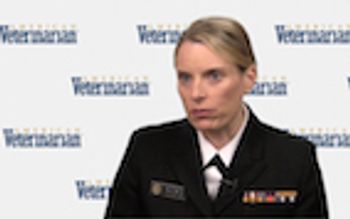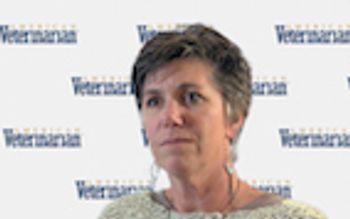
Valerie Fadok, DVM, PhD, DACVD, dermatologist in the Veterinary Specialty Team at Zoetis, discusses the seasonality of dermatophytes.

Valerie Fadok, DVM, PhD, DACVD, dermatologist in the Veterinary Specialty Team at Zoetis, discusses the seasonality of dermatophytes.

These 5 stories were the most popular on American Veterinarian this month.

Elke Rudloff, DVM, DACVECC, clinical specialist and residency trauma supervisor at Lakeshore Veterinary Specialists, explains who should be contacted if someone comes across injured wildlife.

Valerie Fadok, DVM, PhD, DACVD, dermatologist in the Veterinary Specialty Team at Zoetis, discusses how the management of canine atopic dermatitis has changed over the years.

Elke Rudloff, DVM, DACVECC, clinical specialist and residency trauma supervisor at Lakeshore Veterinary Specialists, explains the importance of pet owners contacting their veterinarian before transporting an injured pet.

Valerie Fadok, DVM, PhD, DACVD, dermatologist in the Veterinary Specialty Team at Zoetis, discusses the different factors that veterinarians should consider before diagnosing patients with atopic dermatitis.

Elke Rudloff, DVM, DACVECC, clinical specialist and residency trauma supervisor at Lakeshore Veterinary Specialists, explains how veterinarians can evaluate if a patient has experienced neurological trauma.

Lauri A. Hicks, DO, captain, US Public Health Service, director, Office of Antibiotic Stewardship, medical director, Get Smart: Know When Antibiotics Work, Division of Healthcare Quality Promotion, Centers for Disease Control and Prevention, discusses why there should be local coalitions in each state that include both animal and human healthcare communities dedicated to fighting antibiotic resistance.

Lauri A. Hicks, DO, captain, US Public Health Service, director, Office of Antibiotic Stewardship, medical director, Get Smart: Know When Antibiotics Work, Division of Healthcare Quality Promotion, Centers for Disease Control and Prevention, explains how appropriate antibiotic use is a collective duty.

Lauri A. Hicks, DO, captain, US Public Health Service, director, Office of Antibiotic Stewardship, medical director, Get Smart: Know When Antibiotics Work, Division of Healthcare Quality Promotion, Centers for Disease Control and Prevention, explains how the fight against antibiotic resistance is part of the One Health initiative.

Diane Levitan, VMD, DACVIM, from Peace Love Pets Veterinary Care, explains that some dogs have a genetic predisposition to become hypothyroid.

Diane Levitan, VMD, DACVIM, from Peace Love Pets Veterinary Care, lists key points to take into account when diagnosing and treating canine hypothyroidism.

Elke Rudloff, DVM, DACVECC, clinical specialist and residency trauma supervisor at Lakeshore Veterinary Specialists, explains how to stabilize a multi-trauma case.

Elke Rudloff, DVM, DACVECC, clinical specialist and residency trauma supervisor at Lakeshore Veterinary Specialists, explains how to transport animals safely from the scene of an accident to a veterinary hospital.

Tina Wismer, DVM, DABVT, DABT, MS, medical director at the ASPCA Animal Poison Control Center, explains how Xylitol can be dangerous to dogs.

Elke Rudloff, DVM, DACVECC, clinical specialist and residency trauma supervisor at Lakeshore Veterinary Specialists, explains how to approach an injured animal.

Diane Levitan, VMD, DACVIM, from Peace Love Pets Veterinary Care, discusses treatment for hypothyroidism.

Diane Levitan, VMD, DACVIM, from Peace Love Pets Veterinary Care, explains why hypothyroidism is so easily misdiagnosed.

Tina Wismer, DVM, DABVT, DABT, MS, medical director at the ASPCA Animal Poison Control Center, explains what to do if a dog ingests electronics, such as a remote control or batteries.

Rebecca Rose, CVT, president and founder of Catalyst Veterinary Practice Consultants, explains how to keep discussions meaningful and subjective in the veterinary practice.

Mark Stephenson, DVM, chief veterinarian at Voyce PRO, explains how Ultra wideband will be a game changer for remote monitoring.

Tina Wismer, DVM, DABVT, DABT, MS, medical director at the ASPCA Animal Poison Control Center, explains what to do if your dog ingests chemical products from around the house.

Elke Rudloff, DVM, DACVECC, clinical specialist and residency trauma supervisor at Lakeshore Veterinary Specialists, explains how to distinguish between single- and multi-trauma cases.

Tina Wismer, DVM, DABVT, DABT, MS, medical director at the ASPCA Animal Poison Control Center, talks about using acepromazine for ADHD medication ingestion in dogs.

Mark Stephenson, DVM, chief veterinarian at Voyce PRO, explains how to quantify pain in animals.

Tina Wismer, DVM, DABVT, DABT, MS, medical director at the ASPCA Animal Poison Control Center, outlines the necessary steps in handling cases of canine grape/raisin poisoning.

Tina Wismer, DVM, DABVT, DABT, MS, medical director at the ASPCA Animal Poison Control Center, explains what pet owners should do if their dog is choking.

Tina Wismer, DVM, DABVT, DABT, MS, medical director at the ASPCA Animal Poison Control Center, outlines necessary steps in handling a case of animal intoxication.

Rebecca Rose, CVT, president and founder of Catalyst Veterinary Practice Consultants, discusses some limitations that may hold those in the veterinary field back professionally.

Debbie Martin, LVT, VTS (Behavior), animal behavior technician for Veterinary Behavior Consultations, co-owner of Team Education in Animal Behavior, explains pet socialization.